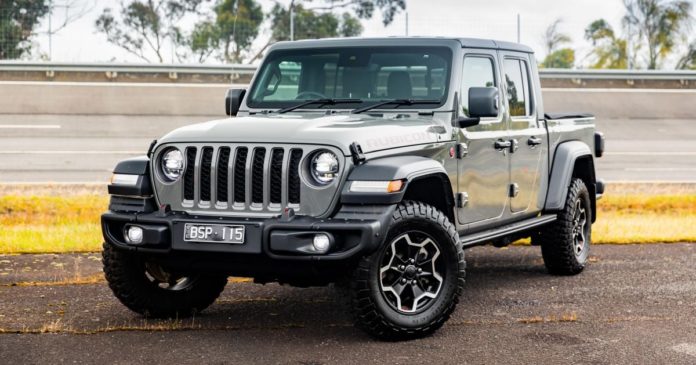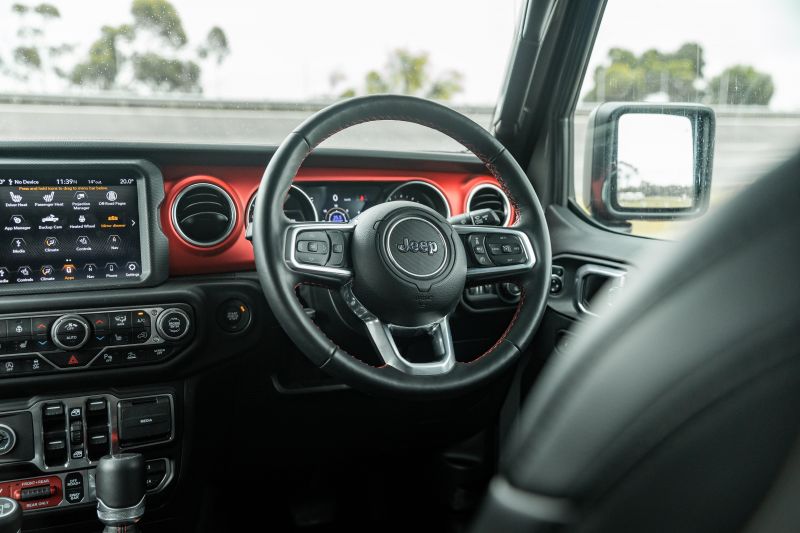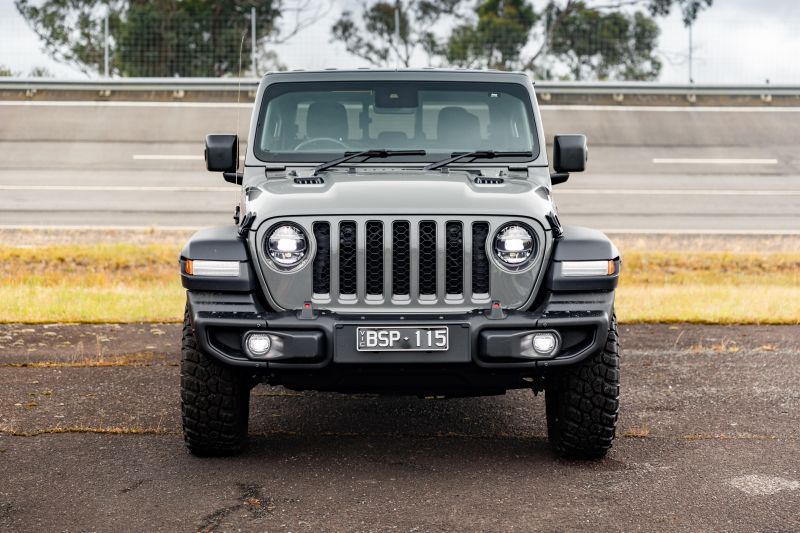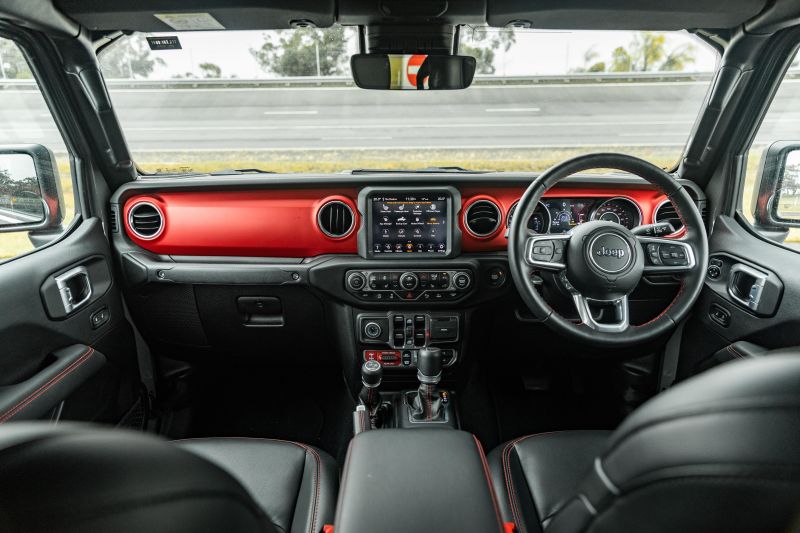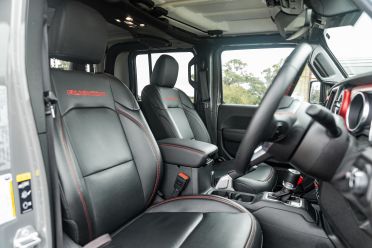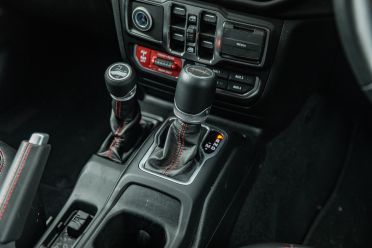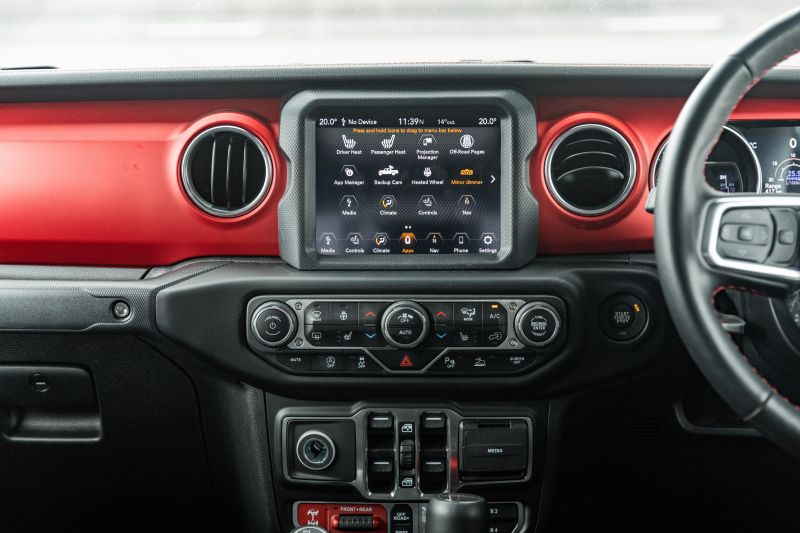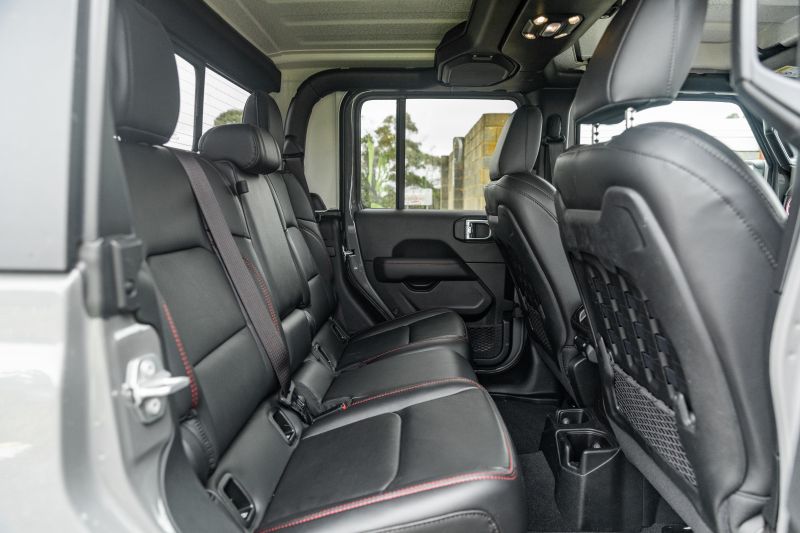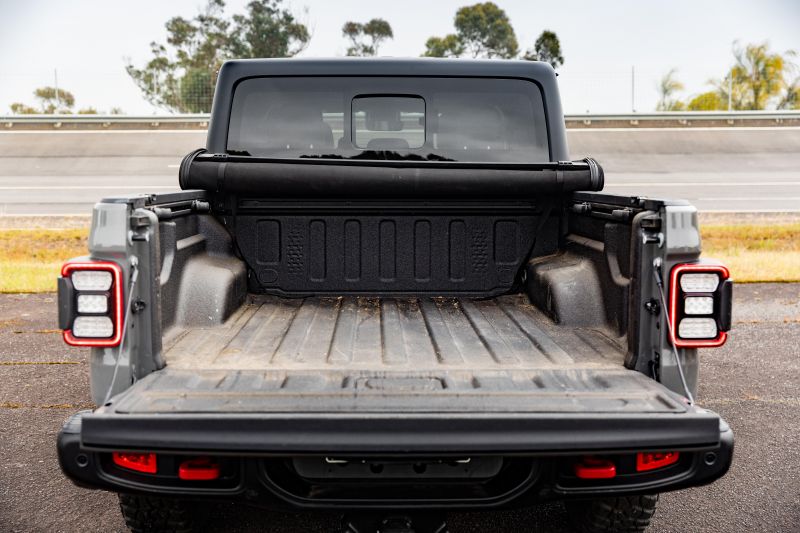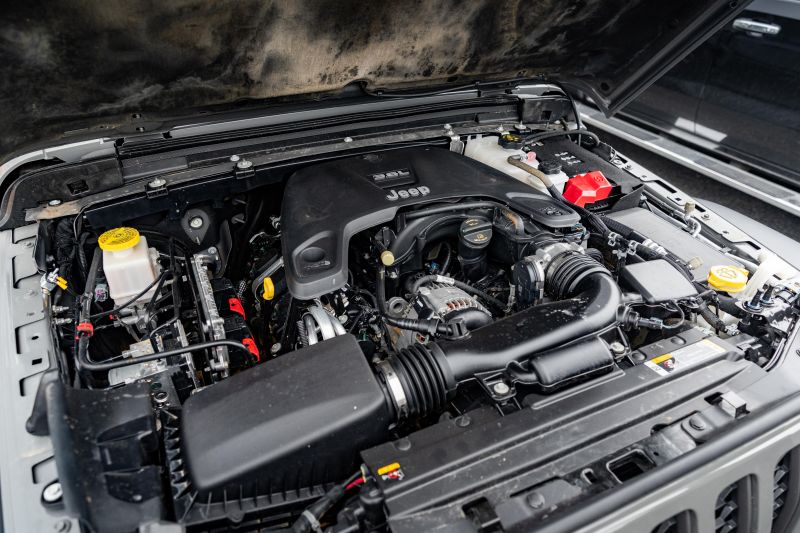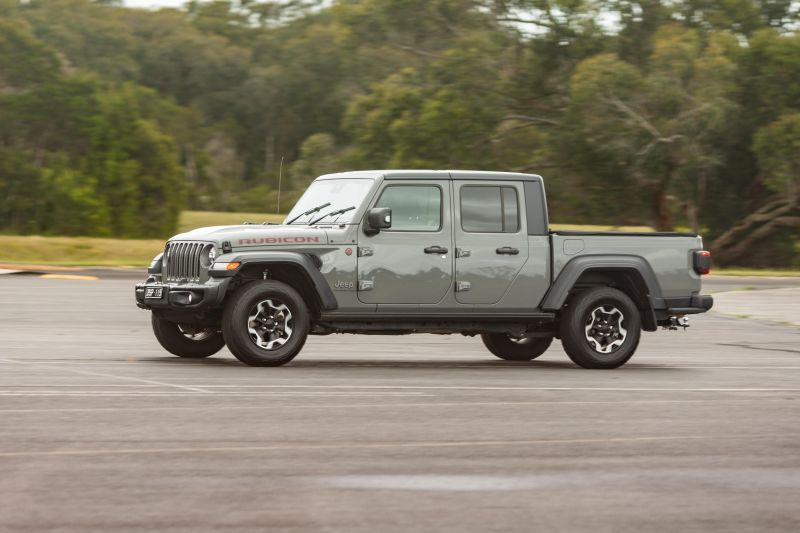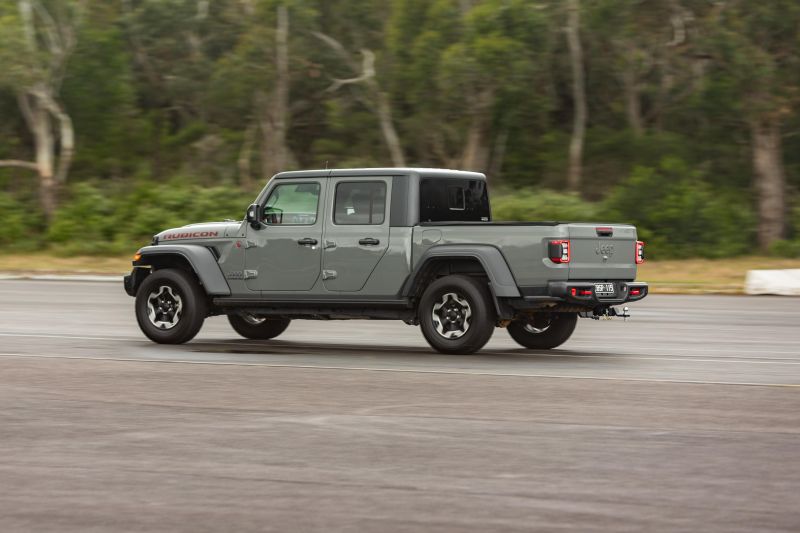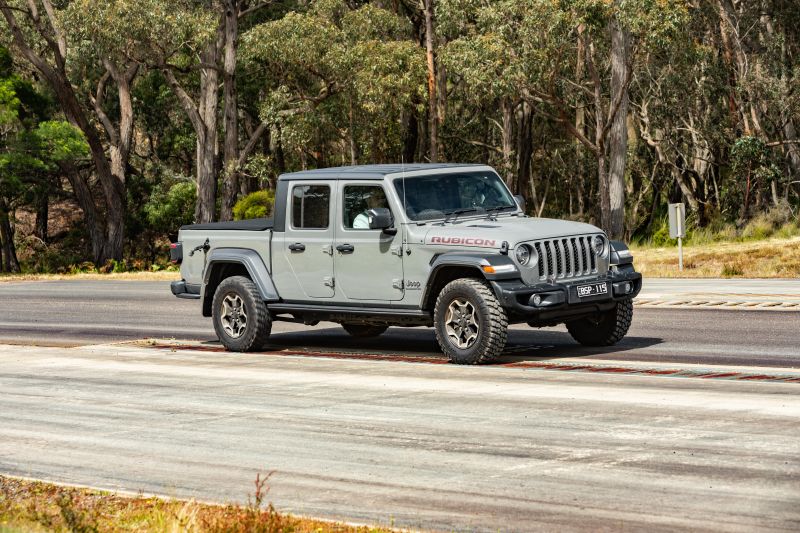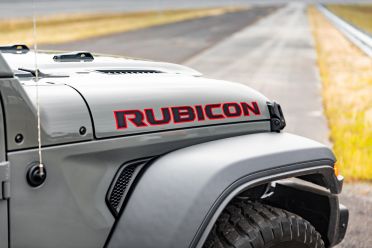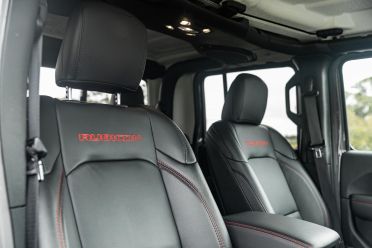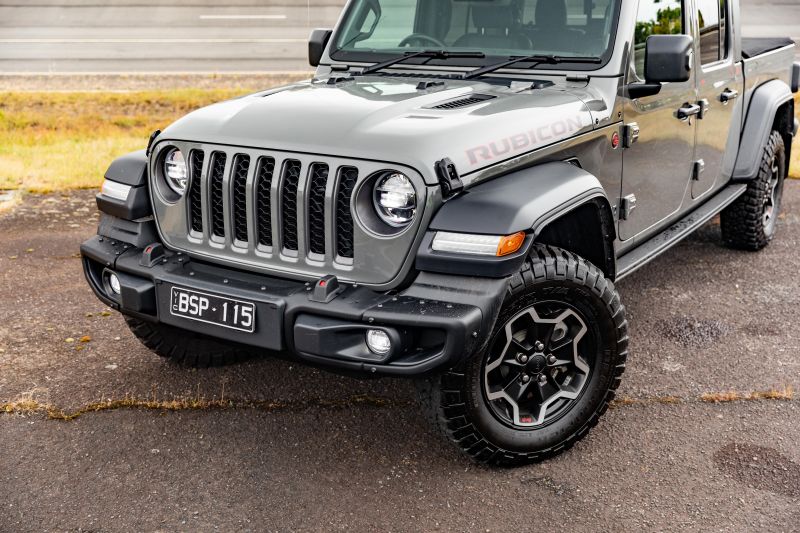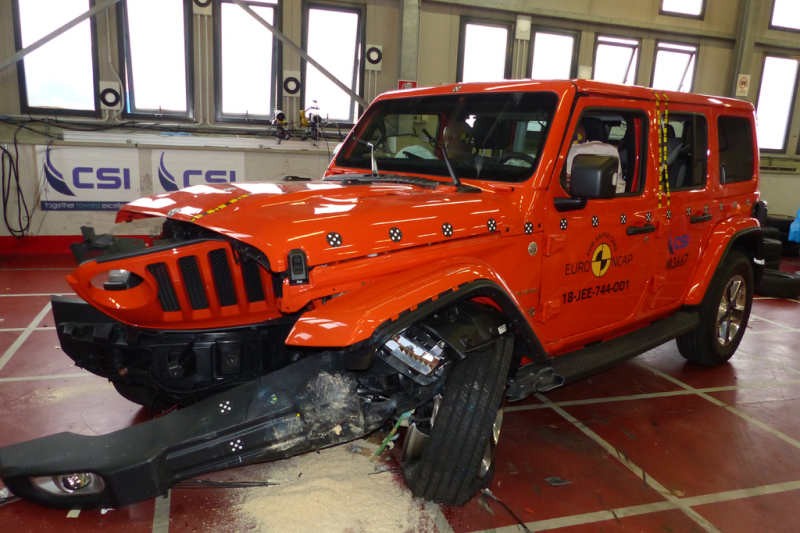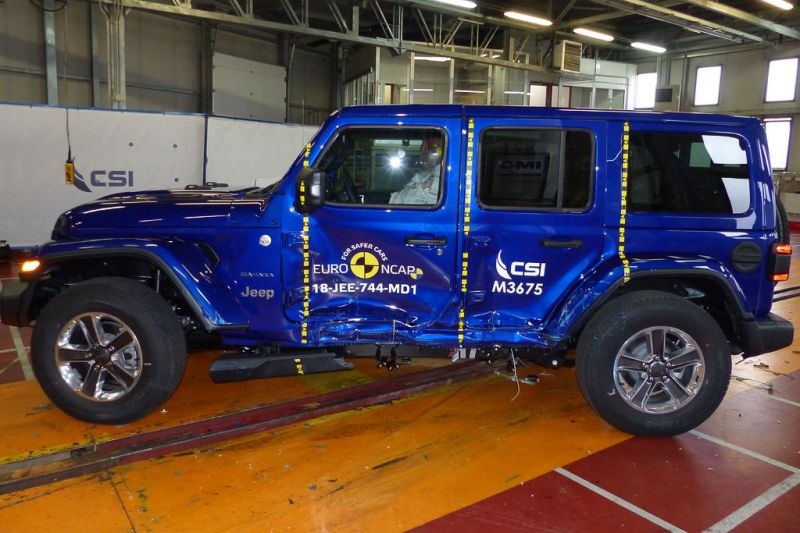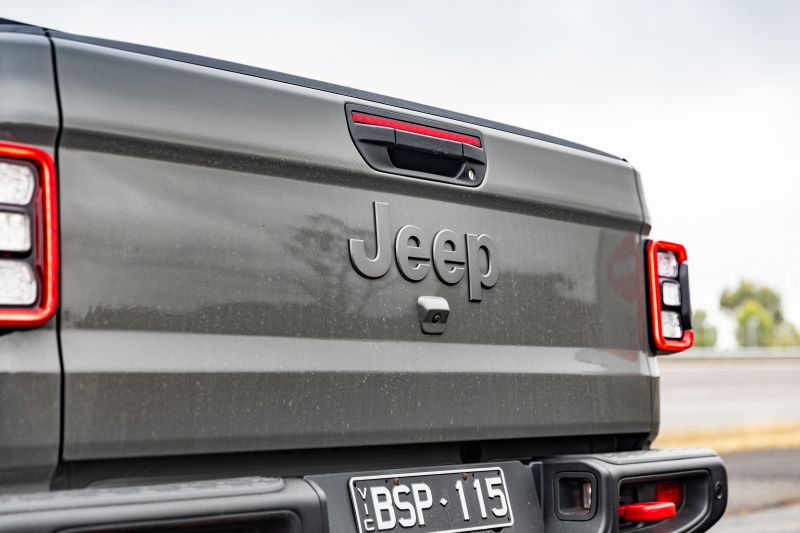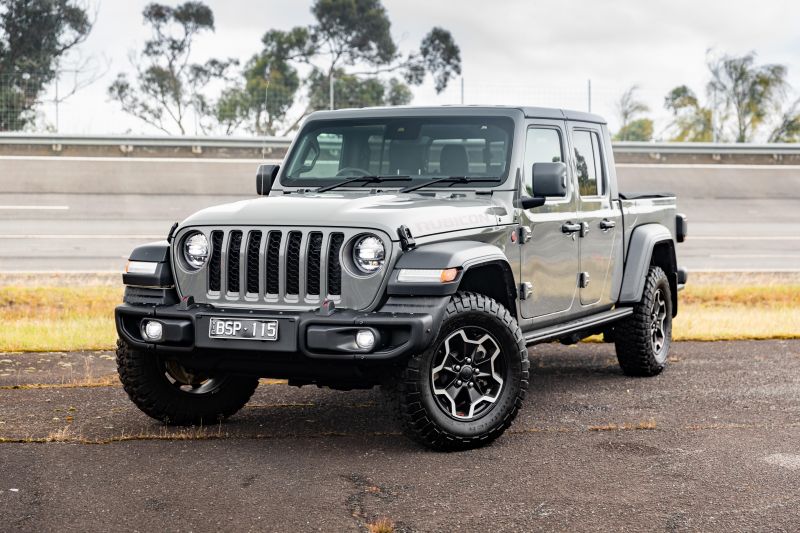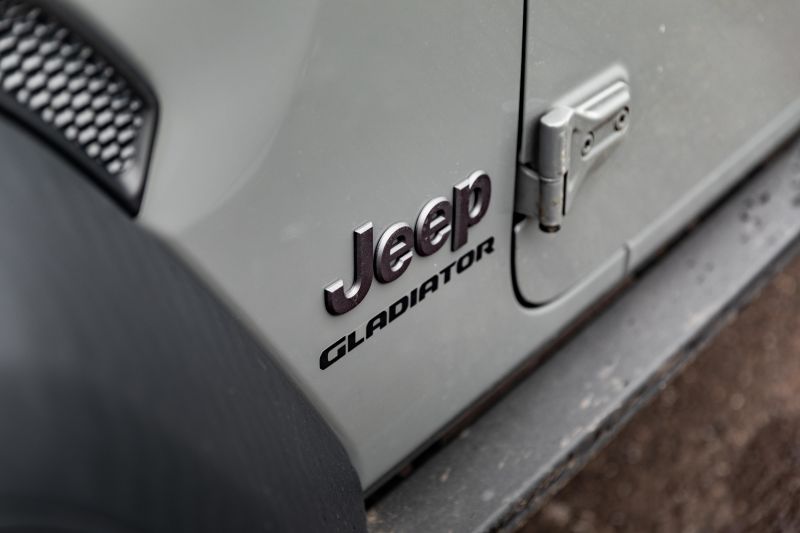Aussies love retro 4x4s and they also love utes – so the Jeep Gladiator should be a winning combo, right?
Not quite, if you go by the sales charts. Jeep doesn’t even hold 1.0 per cent share in what is Australia’s second-largest new vehicle segment, with just 507 Gladiators registered to the end of July 31.
When you consider the two top-selling vehicles in Australia are the Ford Ranger and Toyota HiLux, you’d think the iconic American off-road brand would be getting a bigger slice of the pie.
Part of the reason for this could be the Gladiator’s left-field approach; it’s petrol-only in a predominantly diesel-powered world, and its braked towing capacity maxes out at just over 2700kg rather than the segment benchmark of 3500kg.
But that’s not to say the Gladiator doesn’t have anything going for it…
For starters it stands out not just because of its size (it’s 5591mm long and 1894mm wide), but because of its iconic Wrangler design traits. It’s also available in a range of eye-catching paint finishes.
Plus there’s a huge range of accessories available both from Stellantis’s genuine Mopar division, as well as the aftermarket. I’ve seen some tricked-out examples on the road, and they look fantastic.
So, can the Gladiator make a case for itself in the ute-crazy Australian market?
Note: Our test vehicle was an MY22 example, and may differ slightly from M23 specifications
How much does the Jeep Gladiator Rubicon cost?
Prices went up yet again for the Gladiator for 2023, to the tune of nearly $5000.
The rugged Rubicon flagship on test is now $87,250 before on-road costs, $4800 dearer than the 2022 version.
Jeep’s price rises have been compensated somewhat with some specification adjustments, which in the Rubicon sees the Fox shocks are replaced with Tenneco items and 17-inch machined black wheels replace the polished black units seen here on our 2022 tester. The Rubicon also loses the option of a Black/Dark Saddle interior.
The front axle disconnect feature is no longer available, though it still features front and rear electronically locking differentials plus a sway bar disconnect. Jeep also notes fuel economy is unchanged.
2023 Jeep Gladiator pricing:
- Jeep Gladiator Night Eagle: $78,250 (+$4800)
- Jeep Gladiator Rubicon: $87,250 (+$4800)
Prices exclude on-road costs
What is the Jeep Gladiator Rubicon like on the inside?
Just like a Wrangler.
Having recently reviewed the Wrangler Rubicon, the Gladiator Rubicon’s cabin is pretty much identical to that of the boxy off-roader – unsurprising given the two vehicles are virtually the same to the C-pillars.
There’s the same upright, bluff dash fascia and eye-catching red trim insert, huge banks of physical switchgear and contrast red top-stitching throughout the cabin, much like its Wrangler Rubicon twin.
It has a classic layout, with conventional analogue gauges, a square touchscreen integrated into the fascia, and a heavy helping of buttons and switches – no capacitive nonsense here. Everything also has a chunky, mechanical feel to it.
Build quality is fairly solid, with the exception of the squeaky roof and door trims due to their removable nature. I also am not a fan of Jeep’s brittle stalks, which at times can feel like they’re about to break when you use them.
Storage is okay but not standout. There are cupholders between the the front seats and a generous cubby under the centre armrest. Given the doors are removable, storage is limited to nets lower down, which means heavier items will either move around or fall out – like my big 1L water bottle did.
The front seats are perched high, giving you a commanding driving position as you’d expect, though it’s still a little difficult to see over the Gladiator’s long bonnet, which also has a hefty steel bumper jutting out lower down. Unlike the Wrangler, the Gladiator’s optional Trail Ready Package doesn’t appear to include a front-facing off-road camera.
Despite the near-$90,000 price tag, adjustment for the front seats is manual, but with that said it’s in line with the Gladiator’s rugged, retro vibe. There’s a good range of adjustment. I found a comfortable, if lofty perch, which suited my 6’1 frame.
I really like how the leather-trimmed steering wheel (leatherette for 2023) looks and feels, and the instruments incorporating analogue gauges and a 7.0-inch supervision display are nicely legible and have cool graphics. The Rubicon spec also scores a heated steering wheel for chilly Melbourne mornings or if you venture to the snow.
The other thing I’d note is Jeep’s unusual approach to the steering wheel controls. Instead of paddle shifters you have the volume and skip controls as toggle switches behind the wheel, which can take a little getting used to.
Centred in the dashboard is an 8.4-inch touchscreen running Stellantis’s Uconnect 4 interface, common to the brand’s previous-generation models – the Compass and Grand Cherokee have moved to Android-based Uconnect 5 software.
There’s embedded navigation, AM/FM/DAB radio, Bluetooth phone and audio streaming, as well as wired Apple CarPlay and Android Auto. The infotainment unit offers a good level of features and functions, and the 4×4-themed graphics are a nice touch.
Everything works as you’d expect, and the interface is pretty responsive. The off-road menus were a particular highlight, showing you all sorts of information on the go when you’re hitting the bush.
Another funky design element are the window switches located on the centre stack on the dashboard. I can’t tell you how many times I went for the driver’s door for the windows – but you get used to it. The fat grab handle ahead of the passenger is another off-road-ready touch, and helps when climbing in and out, or when the terrain gets a little rough.
The Gladiator shares its four-door body with the Wrangler Unlimited, but it gets a longer wheelbase (3488mm v 3008mm) to accommodate the tray at the rear. It offers the same rear accommodation as the longer Wrangler, which means it’s actually quite spacious.
The boxy body means there’s heaps of headroom even if you’re above average height like myself, and there’s good leg-, knee-, and toe room even with the high floor. Big, square windows make for excellent outward visibility – through the long tray makes the reversing camera quite handy – and there’s a range of amenities for rear occupants.
Rear air vents, window switches, USB-A and USB-C outlets, and a 230V AC outlet all live behind the centre console. There are also net pockets behind the front seats, and a fold-down centre armrest.
You can also fit ISOFIX child seats on the outboard positions, though parents considering the Gladiator as a rugged family car should note there’s no airbag coverage in the second row and some not-so-impressive crash-testing results. More on that further down.
The tray measures 1531mm long and 1137mm wide between the arches – for reference the tub on the new Ford Ranger measures in at 1464mm long, 1520mm wide, 831mm tall, and offers 1217mm wide between the arches.
Likewise, while payload has been increased to 693kg, it’s still lower than even the Ranger Raptor 753kg. Gross vehicle mass is 2935kg while braked towing capacity is 2721kg, again lower than the 3.5t offered by segment benchmarks.
What’s under the bonnet?
All Gladiator models in Australia are powered by a naturally aspirated 3.6-litre petrol V6 engine producing 209kW (6400rpm) and 347Nm (4100rpm) – the same as the related Wrangler.
It’s mated with an eight-speed automatic transmission and four-wheel drive.
The Night Eagle has Jeep’s Selec-Trac active on-demand four-wheel drive system, while the Rubicon upgrades to the Rock-Trac system with locking front and rear differentials, electronic front stabiliser bar disconnect, and Tenneco shocks front and rear. All models have skid plates to protect the fuel tank, transfer case and transmission.
Jeep claims the 2023 Gladiator uses 12.4L/100km on the combined cycle. It can run on 91 RON regular unleaded and has an 83L fuel tank. The Gladiator’s V6 petrol engine has been homologated to Euro 5 emissions standards, and emits a claimed 288g/km of CO2 on the combined cycle.
Jeep quotes a kerb mass of 2242kg for the Gladiator Rubicon, with a max braked towing capacity of 2721kg with 272kg tow ball download – a way off the 3.5t benchmark for the class.
Further, payload is rated at 693kg while Gross Vehicle Mass (GVM) and Gross Combined Mass (GCM) are quoted at 2935kg and 5656kg respectively.
How does the Jeep Gladiator Rubicon drive?
Again, like a Wrangler – only longer and heavier.
The Gladiator weighs more than the equivalent Wrangler Unlimited, so there’s a bit of extra heft to go with the ute’s added size.
It feels very substantial to drive, and is perhaps less fidgety than the Wrangler due to its extended wheelbase. The loose steering around centre still requires constant corrections to keep the Gladiator on the straight ahead though, much like its wagon-bodied counterpart.
Performance is decent from the naturally-aspirated V6, which is more responsive and easier on the ears than clattery four-cylinder diesel competitor – but it’s not what you’d call effortless, and is off the pace compared to turbocharged V6 or eight-cylinder petrol alternatives.
In our performance tests the Gladiator was middle of the pack, with its 10.3s run from 0-100km/h behind even the V6 diesel-powered Ford Ranger Wildtrak by 1.5 seconds (8.9s). It was also only about a second quicker than four-cylinder diesel rivals like the Toyota HiLux and Isuzu D-Max.
While it’s a bit slow, the Gladiator’s V6 has a brassy tone to it, and really sings when you give it a boot. So, it’s not all bad…
The Gladiator did, however, fall further back in our overtaking test, taking 8.4s to accelerate from 80-120km/h, which was worse than a HiLux (8.2s).
Braking was also middle of the pack, with the Gladiator taking 45.9m to come to a stop from 100km/h. It was beaten by the D-Max, BT-50, HiLux and Triton, as well as the Ram 1500 and Chevrolet Silverado.
Our dyno test also showed the Gladiator has the greatest loss of power between quoted power outputs and power at the wheels. The dyno noted 121kW, which was again about middle of the pack, but was 42.1 per cent down on the factory quote of 209kW.
Outside the parameters of the Ute Mega Test, the Gladiator proved to be a bit big for urban duties, particularly when parking.
At 5.5m long it’s too big for most suburban carparks and parallel street spaces, while the knobbly all-terrain tyres can be heard as they roll on the highway. Wind and engine noise are reasonably muted when at speed.
Drive it gently and the nine-speed automatic does a pretty good job shuffling through the ratios, and not constantly hunting for the right gear – though hit an incline or do an overtake and you’ll see it kick-down pretty often and get that V6 spinning.
It’s a shame Australia never got the 3.0L V6 turbo-diesel once offered in the USA, which would give the Gladiator more low down torque for better pulling power, and make it more competitive against the likes of the new Ranger.
It feels more 4×4 as opposed to SUV in terms of handling too, retaining the Wrangler’s top-heavy feeling in bends. The light and direct steering, however, makes it less of a workout to navigate tighter streets and manoeuvres.
The Gladiator’s driver assistance suite covers most bases, with adaptive cruise (which comes to a stop but won’t re-engage on its own), blind-spot monitoring and rear cross-traffic alert. There’s no lane-keeping aid of any kind, but the aforementioned systems and reversing camera help to keep you across the Gladiator’s borders at any given time.
The Gladiator claws back plenty of ground once you take it off the beaten track – it actually won the off-road portion of our Dual-Cab Ute Mega Test.
With heavy-duty Dana axles, locking front and rear diffs, a 4:1 low-gear ratio, all-terrain tyres, and even a disconnecting front sway bar for maximum articulation, the offset moguls showed off how good its axles are at dropping into holes, which enabled it to easily clamber out.
It actually walked up Gravel Mountain in low-range with just the rear diffs locked. Naturally Paul made another run with the front diff locked and sway bar detached, as well as the Off Road Plus traction control mode just for fun, as you can watch – “next level stuff,” Paul said.
Watch the video below for more!
Tech Specs:
- Engine: 3.6-litre petrol V6
- Power and torque: 209kW and 347Nm
- Transmission: 8-speed automatic
- 4×4 system: Full-time (2H, 4A, 4H, 4L)
- Diff lock/s: Front and rear
- Ground clearance: 249mm
- Approach angle: 40.7 degrees
- Breakover angle: 18.4 degrees
- Departure angle: 25.1 degrees
- Wading depth: 760mm
- Tyres: BFGoodrich Mud Terrain TA
What do you get?
Gladiator Night Eagle highlights:
- Auto LED headlights
- LED fog lights
- Removable hard top
- Removable doors
- Body-colour fender flares
- Black grille
- 17-inch alloy wheels
- Tyre pressure monitoring
- 8.4-inch touchscreen infotainment system
- Satellite navigation
- DAB digital radio
- Apple CarPlay, Android Auto
- 7.0-inch instrument cluster screen
- 9-speaker Alpine sound system
- Cloth upholstery
- Leatherette-wrapped steering wheel
- Wash-out interior with drain plugs, removable carpet
- Remote start
- Keyless entry and start
- Tilt and telescopic steering column adjustment
Gladiator Rubicon adds:
- Steel rear bumper
- Black fender flares
- Body-colour grille
- Bonnet decal
- Heated front seats
- Leather upholstery
- Leather-wrapped shifter, parking brake
- Heated steering wheel
- LED interior lighting
- Illuminated vanity mirrors
As noted further up, 2023 has brought about some specification adjustments across the range.
The Night Eagle’s steering wheel is now wrapped in leatherette instead of leather, while its 650 Amp battery has been swapped for a 700 Amp one.
On the Rubicon, the Fox shocks are replaced with Tenneco items and 17-inch machined black wheels replace polished black ones. The Gladiator Rubicon also loses the option of a Black/Dark Saddle interior.
The front axle disconnect is no longer available, though it still features front and rear electronically locking differentials plus a sway bar disconnect.
Options
Lifestyle Adventure Group: $2950
- HD Electrical Group
- 4 x programmable AUX switches
- 240-Amp alternator
- Cargo Group incl. Trail Rail System
- Lockable rear underseat storage
- Spray-in bedliner
- Wireless Bluetooth speaker
Rubicon Premium Package: $2950 (Rubicon)
- Body colour fender flares
- Body colour Freedom Hard Top
Trail Ready Package: $2000 (Rubicon)
- Steel front bumper
- 17-inch machined wheels, black painted
Colours
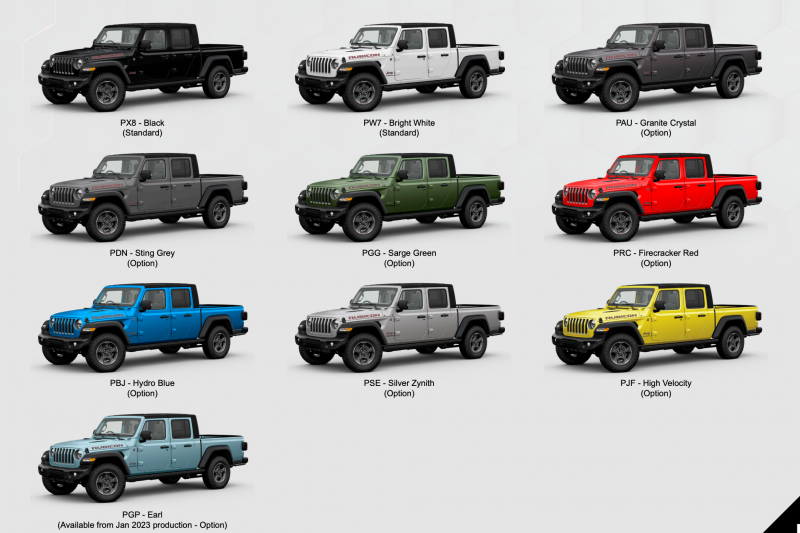
Standard
Premium: $895
- Granite Crystal
- Sting Grey
- Sarge Green
- Firecracker Red
- Hydro Blue
- Silver Zynith
- High Velocity
- Earl
Is the Jeep Gladiator Rubicon safe?
The Jeep Gladiator wears a three-star ANCAP safety rating from 2019 – ANCAP gave the Gladiator the same rating and category scores as the Wrangler due to the two models’ close relation.
The Gladiator and Wrangler received an adult occupant protection score of 60 per cent, child occupant protection score of 80 per cent, vulnerable road user protection score of 49 per cent, and a safety assist score of 51 per cent.
Hurting the Wrangler’s performance were the absence of lane-keep assist and emergency lane keeping systems, as well as head-protecting side airbags for the rear seats.
The company’s then-CEO James Goodwin still knocked various aspects of the Wrangler’s safety package even after running updates – where the off-roader picked up safety features like autonomous emergency braking (AEB) and blind-spot monitoring across the range.
“These upgrades are welcome, and I commend the local supplier for moving to provide Wrangler buyers in Australia and New Zealand with collision avoidance capability,” Mr Goodwin said in December 2019.
“While a three-star rating is still somewhat shy of the expected five stars, all upgraded models now have the ability to detect and assist with avoiding a crash with another vehicle – both in lower and higher speed scenarios. Unfortunately the upgraded AEB system fitted to updated models is not yet able to detect our most vulnerable road users in pedestrians and cyclists,” he continued.
“Consumers should be aware that the structural deficiencies we saw with the originally-tested model such as A-pillar and cross-fascia beam failure, footwell intrusion, high seatbelt loads and excessive pedal movement have not been addressed and remain a risk for occupants,” Mr Goodwin added.
Standard safety features include:
- 4 airbags
- Dual frontal
- Dual combo side (head, chest)
- Autonomous Emergency Braking (AEB)
- Adaptive cruise control
- Blind-spot monitoring
- Forward collision warning
- Parking sensors front, rear
- Rear cross-traffic alert
- Reversing camera
- Tyre pressure monitoring
How much does the Jeep Gladiator Rubicon cost to run?
The Jeep range is covered by a five-year, 100,000-kilometre warranty in Australia – whichever comes first.
While the five-year window is on par with the industry average, the 100,000km cap is shorter than the unlimited mileage offered by most other brands. You do get 24/7 roadside assistance included for the duration of the warranty period.
Jeep also offers five years of capped-price servicing, with intervals of 12 months or 12,000km for its petrol models.
Like the Wrangler, you’ll pay $399 per visit for the first five years, amounting to $1995 for that period. Every time you get your vehicle serviced at a Jeep dealership, you’ll receive an additional 12 months of roadside assistance for the lifetime of your vehicle.
During our recent 12-ute Mega Test, the Gladiator came up at the back of the pack for fuel consumption. On the bowl at our proving ground unladen, the Jeep recorded a figure of 11.3L/100km which then climbed to 42.7L/100km when hooked up to a 3kN resistance trailer dyno.
For reference, only the Ford Ranger Raptor was thirstier unladen (11.6L/100km), and it even fared worse than the much larger Ram 1500 Laramie with its Hemi V8 (11.2L/100km). Outside of the Mega Test, we observed similar figures in mixed driving.
CarExpert’s Take on the Jeep Gladiator Rubicon
If the Gladiator Rubicon was still priced around the $75,000 mark like it was when it first launch in 2020, this review may have gone quite a bit differently.
It was expensive at the time, but these days that sort of money gets you into a top-spec Toyota HiLux GR Sport with a similar off-road focus, but less of the cool-factor that comes with the Gladiator.
But now as a nearly $90,000 proposition (before on-road costs), you’d have to really love it to buy one against what’s available in the market in 2023.
A Ford Ranger Raptor offers better performance, way more technology and still retains a better payload and towing capacity. If you’re stuck on petrol instead of the usual diesel fuel type for dual-cabs but don’t want to wait for a Raptor, the new Volkswagen Amarok TSI452 likewise offers you more performance, features and capability for $10,000 less!
Family buyers looking to use the Gladiator as a primary vehicle should also note the safety credentials as tested by ANCAP and Euro NCAP. I know it’s not a deal-breaker for all, but for many it could be the difference between signing the dotted line or not if you plan to put your kids in the back often.
The Jeep no doubt has a proper American truck vibe the Thai-produced competition just can’t match, and as our Mega Test showed it’s pretty much unstoppable off-road. There’s also a heap of accessories in Jeep’s catalogue to really tailor the Gladiator to your needs.
Unlike its Wrangler twin though, the Gladiator has too many very capable competitors that will beat it in just about every category bar off-road ability, which makes it hard to recommend as a top pick to a new ute buyer.
Click the images for the full gallery
MORE: Everything Jeep Gladiator

